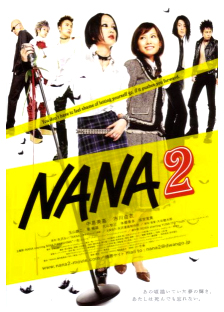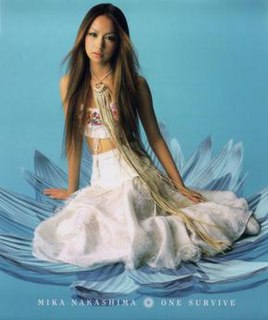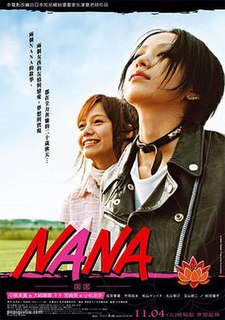
The Chemical Brothers are a British electronic music duo composed of Tom Rowlands and Ed Simons, originating in Manchester in 1989. Along with the Prodigy, Fatboy Slim, and other fellow acts, they were pioneers at bringing the big beat genre to the forefront of pop culture. They achieved widespread success when their second album Dig Your Own Hole topped the UK charts in 1997. In the United Kingdom they have had six number one albums and thirteen Top Twenty singles, including two number ones. In the United States they have won six Grammy Awards including "Best Rock Instrumental Performance", "Best Dance Recording" and "Best Dance/Electronic Album" of the year as recently as 2020.

Takeshi Kitano is a Japanese comedian, television presenter, actor, filmmaker, and author. While he is known primarily as a comedian and TV host in his native Japan, abroad he is better known for his work as a filmmaker. With the exception of his works as a film director, he is known almost exclusively by the stage name Beat Takeshi.
Robert Don Hunter Dougan is an Australian composer, known for his genre-blending music. Mixing elements of orchestral music, trip hop, and bluesy vocals, his work is tangentially relatable to electronic music. He is known primarily for his breakthrough 1995 single "Clubbed to Death ", further popularised by 1999's The Matrix soundtrack. "Clubbed to Death" was re-released on his debut album Furious Angels in 2002, seven years after its initial release, as well as providing several variations of the song, most notably the Kurayamino variation; he has also provided a variation of the Moby classic song "Porcelain". In 1995, he teamed up with Rollo to remix the U2 song "Numb"; the remix was titled "Numb ".

Hideto Takarai, known by his stage name Hyde, is a Japanese musician, singer-songwriter, record producer, and actor. Best known as the lead vocalist of the rock band L'Arc-en-Ciel since 1991, he is also the lead vocalist of Vamps and has a solo career.
Mika Nakashima is a Japanese singer and actress. Five of her studio albums, one of her mini-albums and one of her compilation albums have reached number one in Japan's Oricon album chart. She also embarked on an acting career, most notably as Nana Osaki in the live action film adaptations of Nana. She sold 10 million records in Japan.
"Theme from A Summer Place" is a song with lyrics by Mack Discant and music by Max Steiner, written for the 1959 film A Summer Place, which starred Sandra Dee and Troy Donahue. It was recorded for the film as an instrumental by Hugo Winterhalter. Originally known as the "Molly and Johnny Theme", the piece is not the main title theme of the film, but a secondary love theme for the characters played by Dee and Donahue.

"A House Is Not a Home" is a 1964 ballad recorded by American singer Dionne Warwick, and written by the team of Burt Bacharach and Hal David for the 1964 film of the same name, starring Shelley Winters and Robert Taylor. The song was a modest hit in the United States for Warwick, peaking at #71 on the pop singles chart as the B-side of the top 40 single, "You'll Never Get to Heaven ". Another version of the song, by Brook Benton, which was the version that appeared in the film, was released at nearly the same time. It debuted two weeks earlier on the Billboard Hot 100. Benton's version split airplay with Warwick's, and ultimately peaked at #75.

"Legend" is the fourth single from Mika Nakashima's third album, Music. It was released a month after her mini album Oborozukiyo: Inori. It was a minor success, peaking at #5 in the Oricon charts and charting for 11 weeks. Overall, it sold 67,527 units in Japan, of which more than half in its first week. Legend was used as the Sony MD Walkman CM song. The B-sides were "FAKE"; used as the Kanebo Kate CM song, and "Carrot & Whip"; the Meiji CM song.

"Glamorous Sky" is Mika Nakashima's 16th single overall, her 1st under the name Nana starring Mika Nakashima, and the second most successful single in her career after "Stars". It is her first rock song and it was used as one of the image songs for the film Nana. Hyde of L'Arc-en-Ciel composed "Glamorous Sky". The second and third B-sides, "Blood" and "Isolation" were used as CM songs for Kate cosmetics. Mika Nakashima graces the cover of the single as Nana Osaki. The song is featured as a cover by a jrock band, Girugamesh, in the Konami music games, BEMANI for Drummania V3 and Guitarfreaks V3, as well as the iNiS rhythm game Moero! Nekketsu Rhythm Damashii Osu! Tatakae! Ouendan 2.

"Hitori" (ひとり) is Mika Nakashima's 15th single. It is a re-cut single, originally from her Music album, and was used as the theme song for the PlayStation 2 game Drakengard 2. "Hitori " is the theme song for the game while "Hitori " is the version heard during the credits. It was released on a week ahead of the game. Overall, it sold 26,275 copies according to the Oricon charts.

Nana 2 is the sequel to the Japanese movie Nana, an adaptation of the manga by Ai Yazawa, directed by Kentarô Ôtani. Production for the movie began in mid-September and only one and a half month shootings finished the movie in time for the December 9, 2006 release.

"Mienai Hoshi" is Mika Nakashima's 21st single. This single was released on the 21 February 2007. "Mienai Hoshi" is used as the theme song of the dorama Haken no Hinkaku. "I Love You" is a cover of the song by Ozaki Yutaka. Other than her works with NANA, this single provided Mika Nakashima with her highest first week sales of any single from her in 2 years.

"Sunao na Mama" is Mika Nakashima's 22nd single. This single was released on 14 March 2007, the same day as her album Yes. It appeared in a DoCoMo commercial, and is best described as a midtempo easy listening ballad.

"Cry No More" is Mika Nakashima's 17th single, which replaced Chitose Hajime's Kataritsugu Koto as the closing theme for the anime Blood+. It is a blues-inflected single, and was recorded in the USA. "Black & Blue" was used in CMs that aired in early 2006 by KATE. This single reached #8 on Oricon charts.

"Happy Life" is a song recorded by Japanese singers Mika Nakashima and Salyu. It was released as an exclusively digital single by Sony Music Associated Records on May 12, 2017. It was co-written by Takeshi Kobayashi and Yuko Ando and composed, arranged and produced by Kobayashi. The song was subsequently included as a B-side on the single "A or B". "Happy Life" was used in Tokyo Metro's televised commercial campaign Find My Tokyo, starring actress Satomi Ishihara.

"One Survive" is Mika Nakashima's third single. The single was released on the 6 March 2002. "One Survive", which boasts a sophisticated fusion of house and Latin jazz, was the theme song of Kodak MAX Beauty CM. It reached number eight on the Oricon Weekly Top 200, and the single sold 86,600 copies.

Nana (ナナ) is a 2005 Japanese drama film directed by Kentarō Ōtani. Based on the manga of the same name by Ai Yazawa, the film stars Mika Nakashima as Nana Osaki and Aoi Miyazaki as Nana "Hachi" Komatsu. The film was released on September 3, 2005.

"Yuki no Hana" is the 10th single by Mika Nakashima. It was used as the Meiji boda advertisement song, as well as the Meiji galbo advertisement song. It peaked on the Oricon weekly charts at #3 and sold roughly 248,000 copies. The song "Yuki no Hana" was composed by Ryouki Matsumoto, and the lyric was written by Satomi.

Juunin Toiro is the eighth domestic single release by pop/rock artist misono. The single peaked at #21 on the Oricon charts, but dropped in rank to take the #47 slot for the week.

"Show Me the Way" is the second single by the four-member Japanese hip-hop group Lead, released on October 17, 2002. It charted better than their debut single, ranking in the top ten on the Oricon charts at #7.

















